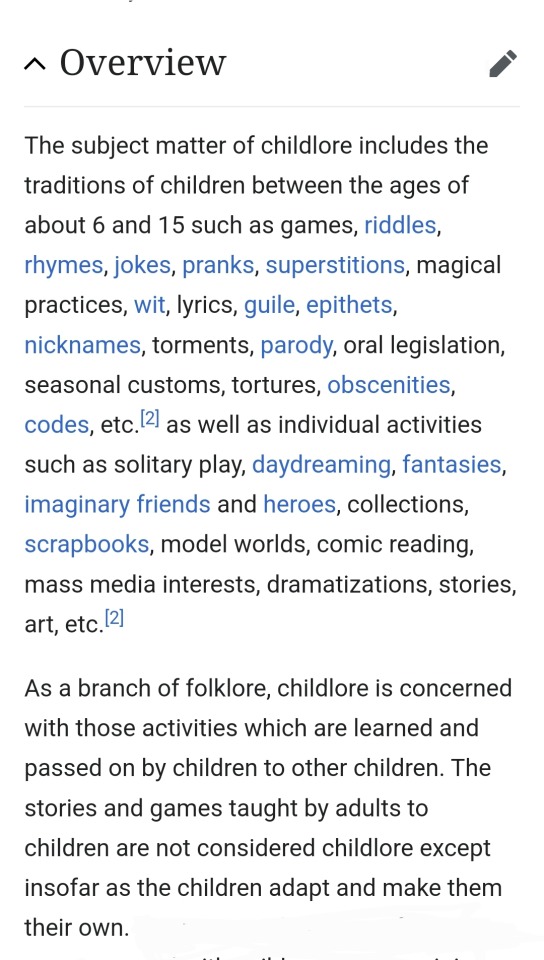#in that sense 'adults passing on childlore' will hand 'down' games &etc that are going to be treated with a lot more relative significance
Explore tagged Tumblr posts
Text
I'd imagine it has something to do with the differences involved in learning in a peer-to-peer space vs subordinate-from-authority space, particularly in terms of what is transformed and what is left unchanged. Because of how thoroughly children are treated as subordinate by anyone who isn't around their age or younger, learning basically anything from anyone who isn't a child carries a particular weight to it that things learned from peers doesn't. It makes sense to make the distinction to me.
Also concepts of what is "appropriate for children" as seen by adults vs what is appropriate for children as seen by themselves vary widely - most adults will not teach a child to play Mercy or the arm burn games or anything, but a good handful of kids looooove playing torture games and will go out of their way to teach them to everyone around them. Likewise, when I was young, my friends and I loved to compete to jump off the highest structures, and my dad - who had done similar and was known for climbing buildings up to third- and fourth-story floors, which he would tell me and my siblings about occasionally - would work OVERTIME to discourage us from doing the same, because as far as he was concerned, we were too young to be doing that sort of thing, even though at my then-age he was, obviously, doing it just as much himself. And now that I am an adult... well, if I saw a seven-year-old climbing onto a roof and excitedly going "Guys, watch this, I'm going to jump off!" I'd be lining up to tel them to stop TOO! The childlore of "climbing onto tall structures and jumping off"-games would be filtered through a lens of appropriate behavior as seen by an adult and not reflect a child's perspective on the subject, if you follow me?

Haunted and excited by this being a field of study
#obviously not every kid has like a REVERENCE for things taught to them by significantly older kids and adults but not only do many of them#we also go out of our way to teach them that adults are Always Right and they must do things the way adults want them to Or Else#kids do obviously take and learn things and change them as they interpret them differently or feel it works better but there's a reason#people tend to say that kids are 'easy' and teens are 'hard' and that's because for the average person it's early teens when they begin#really testing limits and seeing what instructions they can safely change/ignore/defy and as kids they are more likely to take the word of#an adult as essentially gospel#in that sense 'adults passing on childlore' will hand 'down' games &etc that are going to be treated with a lot more relative significance#and seriousness than games invented or taught to them by peer children will be#like as far as i can tell childlore is particularly concerned with the viewpoint attitudes and beliefs of children as created and interpret#interpreted by children through mediums SUCH AS games songs rhymes etc... but it is largely ABOUT how children think and view the world#and their place within it & relations to others within it. So adult perspectives and things taught by adults and left unchanged are kind of#- not irrelevant (as noted by the post - things changed and interpreted outside the expected lens by children are counted) but not focal#sorry for the essay... i was reading anthropological papers all afternoon
67K notes
·
View notes